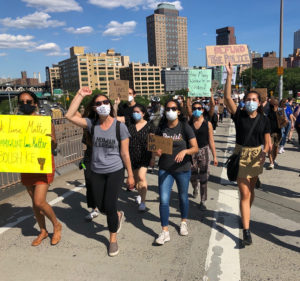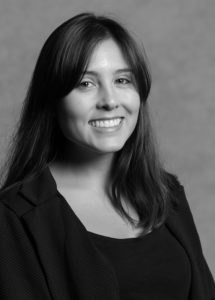Essential Humanism: Profiles of Courage in a Pandemic Part IX: Julia Julstrom Agoyo

Tell us about your job. What are some of the ways it’s changed during the pandemic?
I work as a paralegal for a public defender organization within its immigration practice. Basically, I help the attorneys get our noncitizen clients out of jail if possible. If we succeed, and the client stays in the New York area, we continue to represent them and fight against their deportation. If they aren’t released, we fight their case while they remain detained.
I think it goes without saying that a jail setting is one of the worst, if not the worst, places to be in a pandemic. We’ve focused first on getting our most vulnerable and high-risk clients out and then on getting everyone else out. The first couple of months were highly stressful, especially for our clients and their families. Lots of people were freed, which was amazing, but we are still fighting until the last of our clients are freed as well.
A lot of our day-to-day tasks drastically changed once the pandemic hit. It’s important, and often urgent, to be able to obtain certain criminal court documents for our clients. Once the criminal courts shut down operations, it was at first impossible to obtain any documents. Later on, we were able to liaise with select courts and obtain some. Even now it looks like certain documents from certain courts will remain impossible to retrieve for the foreseeable future. Additionally, all in-person client visits were suspended, at the jails and at our offices, making it very difficult to communicate with clients confidentially and adequately prep their cases. Non-detained immigration court hearings were postponed. Most detained hearings went forward, in the most trying of circumstances. All our staff went fully or mostly remote. I was and continue to print and mail from home, walking to the nearest FedEx or USPS with my mask on and hand sanitizer handy. We started to encounter new needs from our non-detained clients: mainly helping them navigate government assistance if they qualified or, more likely, requesting funds to help them pay for rent and groceries, because many were now unemployed and excluded from receiving government aid.
How do you feel about being an “essential” part of the workforce?

Julia Julstrom-Agoyo
Honestly, even though we were technically designated “essential,” I feel like I can’t claim that title because I have been extremely lucky to be able to work primarily from home while so many “essential” workers continue to show up to work daily and have to risk exposing themselves to the virus. I’m also just super grateful to have been able to keep my job while so many people lost theirs, so I’ve been trying to give back as much as possible, i.e. donating my stimulus check.
Are you required to wear personal protective equipment (PPE) while at work? Is it provided to you?
I have only gone into the office a handful of times since the pandemic hit New York City, and this has been when there may be one other person in the office at the same time or none. I gladly wear my own masks when I go into the office or go on work errands.
What’s something your employer is doing well during the pandemic?
Our organization worked efficiently to get all of us fully or mostly working from home as soon as possible when it was apparent that cases were beginning to rise in New York City. I think that was important, with such a large organization, in preventing any outbreaks within our offices.
What’s something you would change to make your work environment better or safer during the pandemic?
It would be great if the New York City area immigration courts could go back to accepting e-filing (as opposed to physical filings) for all sizes of submissions, for the entirety of this pandemic and even into the future!
How does being an essential worker affect your family? What are their reactions?
My family has been pretty happy with the fact that I hardly go into the office. As my parents are in Chicago, they were very worried for me from the start as they watched the cases in New York City skyrocket. On the other end, my brother, who’s an “essential” worker at a manufacturer in Minneapolis, has had to continue his in-person shifts as usual throughout the whole pandemic, so I think my parents are more worried about him. However, they’ve been very sympathetic and supportive when I call them crying about the injustices of the immigration and prison systems—injustices which were always there but have been exacerbated during this time.
How can the public make your job easier and/or safer?
I wouldn’t say the public needs to do anything to make my job safer, but what would make it easier is if everyone who hasn’t already joined the fight for immigrant rights does so and VOTES in November so that, among other things, we can save what’s left of the asylum system and appoint more reasonable immigration judges.
What kind of positive change do you hope comes out of the pandemic—for you, for society at large?
One thing I hope comes out of the pandemic is that people see, appreciate, and support the many undocumented, noncitizen, and/or immigrant people and people of color that make up the “essential” workforce, including medical workers, grocery store workers, delivery workers, construction workers, restaurant workers, postal workers, etc. Personally, the pandemic has provided me the unexpected opportunity to check in more often (virtually) with family and friends.
Does a religious faith inform your values?
If ethical humanism counts as a religious faith, then yes, 100%!
Do people you interact with on the job express religious beliefs to you or in other ways express their values?
Yes, actually. It’s usually something like “God is looking out for them.” I think it’s common for immigrant families to be very connected to their faith. Just today I got a call in which a client’s partner was explaining that when our client and his family members were released, they had COVID-19 and that she was able to take care of them without getting sick because God was protecting her.
What do you miss the most about your pre-pandemic life?
I really like people, so being almost completely cut off from everyone suddenly—friends and strangers—was a really isolating experience, as I’m sure it was for most extroverts. I missed smiling at strangers on the street (I still do through my mask), meeting new people, and, of course, seeing my friends. I really hated that I suddenly felt fearful of everyone. Now that the numbers are lower in NYC, I’m not so fearful and it has been really nice to start seeing a small number of people outdoors.
